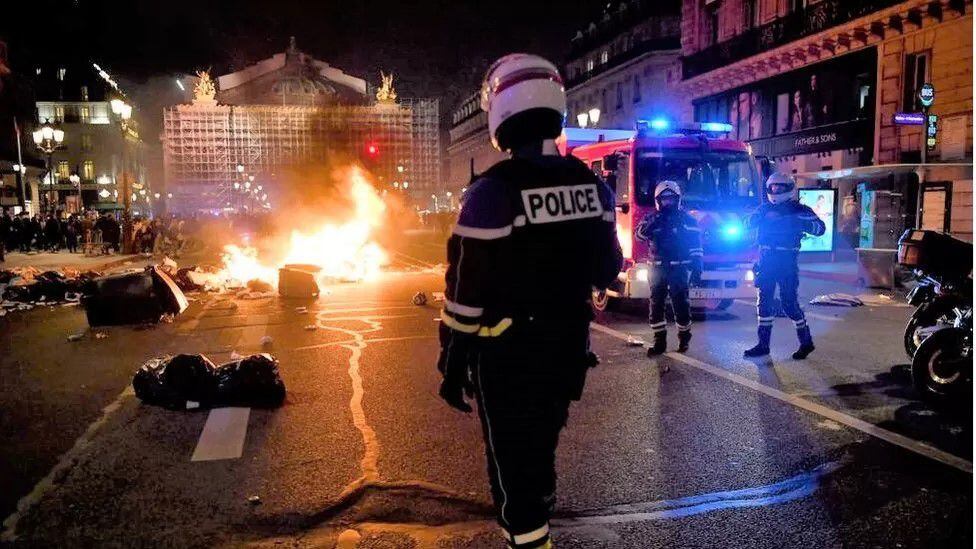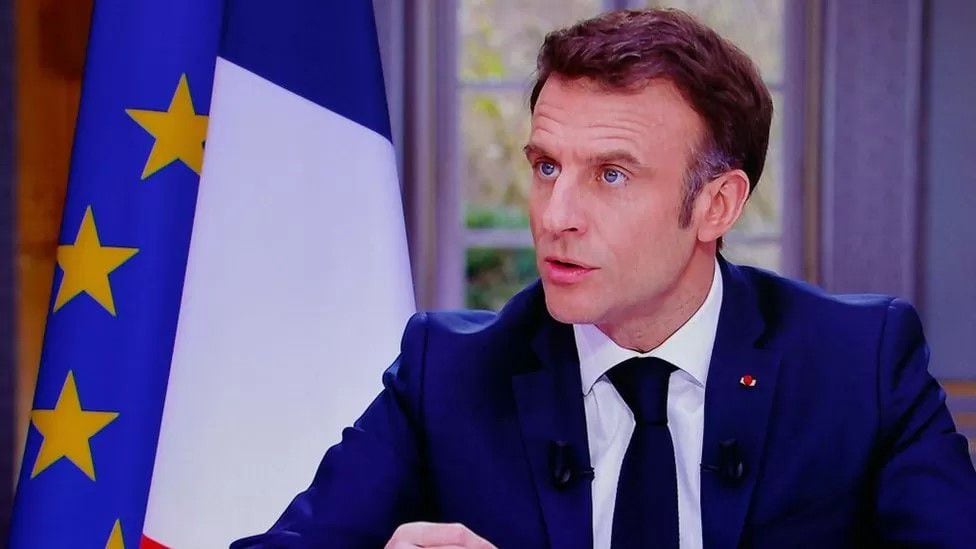:quality(75)/cloudfront-us-east-1.images.arcpublishing.com/elcomercio/GIZTCNZNGAZS2MRUKQYDAORSGM.jpg)
for weeks France It has been rocked by a series of increasingly large strikes and protests against the Emmanuel Macron government’s controversial pension law.
On Thursday, more than a million people took to the streets across the country, according to data from the Ministry of the Interior.
Look: It would not be “serious” to maintain a visit from Carlos III in the face of protests, says Macron
One of the main workers’ confederations, the CGT, put that number at 3 million.
In Paris, where demonstrations have generally been peaceful, some 120,000 people turned out to protest.
Occasional clashes between police and masked individuals broke shop windows, vandalized street furniture and attacked a McDonald’s restaurant in the French capital, the Reuters news agency reported.
Police fired tear gas at protesters and around 80 people were arrested across the country.
In Bordeaux, in the southwest of the country, the fire engulfed the main gate of the city hall after a day of protests and clashes. The fire was quickly put out by firefighters.
there has also been a series of strikes by transport, garbage, and education workers and other sectors throughout the country.
French Prime Minister Élisabeth Borne tweeted: “Speaking and expressing disagreement is a right. The violence and degradation we have witnessed today is unacceptable. All my thanks to the police and rescue forces mobilized.”
On Friday it was announced that the state visit of King Charles III to France, which was to begin on Sunday, was postponed.
We explain below what the pension law consists of and why it is so controversial.
What does the new reform imply?
The new pension law has as main objective gradually raise the retirement age from 62 to 64 years to 2030.
The increase will take place based on three-month increments per year, beginning in September 2023.
The last time the retirement age in France was changed was in 2010, before which it was 60 years.
The reform also advances to 2027 the requirement to contribute 43 years to obtain a pension and not 42 years as has been the case up to now.
In addition, the new law eliminates the retirement privileges enjoyed by some public sector employees, such as workers on the Paris metro.
Resistance to the new law became even stronger after the March 16 the government will force its approval without going through the National Assembly -the lower house of Parliament- where it does not have an absolute majority.

Why is Macron determined to implement the new law?
The pension law was one of Macron’s main proposals during his campaign for the 2022 presidential election.
And the protests and strikes that began in January have not made the president back down, who this week survived two no-confidence motions and defended the reform in a television interview.
“This reform is necessary,” Macron said, stressing that its implementation it will take place at the end of 2023.
The president says that the pension reform is an “unpopular but necessary” way to ensure the future of the country’s pension system.
According to the president, the measure is crucial to avoid the collapse of the generous state pension system of France and to ensure that younger citizens do not shoulder the burden of financing older generations.
Macron says it is about “saving and preventing deficits” in the coming decades.
But opponents argue that the measure will disproportionately affect workers, who are more likely to start working at a younger age and have more physically demanding jobs than executives and white-collar employees.

Will either party relent?
The government survived two confidence votes this week. Now it will be necessary to see if Macron’s determination can overcome the ability of the unions to exert pressure in the streets.
Surveys have shown that more than two thirds of citizens oppose the pension reform.
And according to France 24, “a vast majority of French people have also expressed their support for the strikes that have disrupted classes, public transport and garbage collection.”
Union leaders, who since January have vowed to block the law through strikes and protests, called Macron’s comments on Wednesday defending his reform “disparaging.”
“The President of the Republic made fun of us,” Marie Buisson, a senior CGT official, told France Info radio.
He added that they were “determined” to continue protesting. “Since (the law) was passed by force, there is outrage,” he said. “Our objective is that the maximum number of people stop working.”
Widespread strikes on Thursday led to major transport disruptions on roads and trains, and flight cancellations.
The unions called for new protests for next Tuesday.
Macron faces a huge challenge. Its main project has been approved, but with a high political cost and the dissatisfaction of the majority of citizens.
Source: Elcomercio
I am Jack Morton and I work in 24 News Recorder. I mostly cover world news and I have also authored 24 news recorder. I find this work highly interesting and it allows me to keep up with current events happening around the world.






